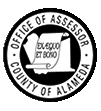Most Popular Topics

The Alameda County Assessor is pleased to announce that the AC Property App is now available on Apple devices. You can lookup your assessed value, property taxes, and parcel map. You can even pay your property taxes right from the app. Download it from the iTunes store.

General & Ownership Information
(510) 272-3787
Business Personal Property:
(510) 272-3836
Our business hours are from 8:30AM to 5:00PM Monday through Friday except for holidays
e-Subscription
Sign-up to receive the Assessor’s Community Newsletter via email or text! This is a free service.
Possessory Interests
What is a Possessory Interest?
A taxable possessory interest (PI) is created when a private party is granted the exclusive use of real property owned by a non-taxable entity. An expanded definition may be found in Revenue and Taxation (R&T) Code Sections 61, 62, 107-107.9, 480. 6, and Property Tax Rules 20, 21, 22, 27, 28 and 29. In very simple terms, for a possessory interest to be taxable it must be independent, durable, and exclusive of the rights held by others.
- Independent: The use must be independent of the public owner. That is, its holder may exercise authority and control of the property apart from the rules and regulations of the public owner.
- Durable: There must be reasonably certain evidence to show that the possession will continue for a determinable period of time.
- Exclusive: Its holder must be able to exclude others from interfering with the use of the property, (or, where there is concurrent use, the concurrent use does not significantly interfere with the holder’s use).
Examples of Possessory Interests
Taxable PIs can be created in virtually any use of government-owned real property. They are typically created when private individuals, companies or corporations lease, rent, or use federal, state or local government-owned facilities and/or land for their own benefit.
Examples of possessory interests include such things as:
- Private companies leasing government buildings.
- Boat slips in public marinas.
- An airplane tie-down at a county airport.
- Tenants, concessionaires and exhibitors at the County fairgrounds.
- Public golf courses leased to private operators.
- Cable television right-of-way easements.
- The right to operate a rental car agency at an airport.
- Container operators at the Port of Oakland.
- Airline terminal and cargo space at airports.
The variety and form of such interests vary widely and evolve continually, and those listed above represent only a portion of the possible possessory interests that may be found.
Property Taxes
California law exempts public agencies from paying taxes on the property they own, thus the lessee, who acquires the possessory interest, must pay property taxes on the possessory interest. The taxation of these interests is rooted in historical precedent. The California legislature first authorized the valuation of possessory interests for property tax purposes in 1859.
Those who receive possessory interest assessments are often puzzled by the seemingly unfairness of paying rent to a government entity while being asked to pay property taxes on property they don’t own. However, government entities do not have to pay property tax and thus, their rent charges do not include an increment to recover such taxes (similar to a triple net lease).
At the same time, the private possessor still receives the services and benefits (fire and police protection, schools, and local government) that other similar taxable properties enjoy, and the possessory interest tax helps to pay the holder’s fair share of those costs.
Discovery of Taxable Possessory Interests
The Assessor, by law, must search out and value all taxable property in the County as of the lien date, January 1, each year. This includes all taxable possessory interests. Annually, pursuant to Revenue and Taxation Code Section 480.6, Assessor’s staff requests every government agency in the County to provide various items of information such as leases and other agreements that are related to the real property they own. This information includes the name, mailing address, situs, lease amendments, assignments, new construction, etc., for each property. The Assessor analyzes this information when making the possessory interest assessments. It is important that the lessees keep this information current with their government landlords and that the agencies cooperate fully with the Assessor so that accurate assessments can be made by the County.
Valuing Possessory Interests
Base year values are established for taxable possessory interests upon change in ownership or completion of new construction under the guidelines of Proposition 13. The requirements for a change in ownership of a taxable possessory interest are found in Revenue and Taxation Code Section 61. A change in ownership occurs when a possessory interest is created, assigned, or upon expiration of the reasonably anticipated term of possession used by the Assessor.
The valuation of PIs differs significantly from other forms of property tax appraisal, as it is the appraiser’s job to value only those rights held by the private possessor. The appraiser must not include the value of any rights retained by the public owner or any rights that will revert back to the public owner (the “reversionary interest”) at the end of a reasonable term of possession.
Taxable PI values differ from real property unencumbered fee values in two ways:
- The Assessor must value only the legally permitted possessory interest use under the agreement, which may not be the highest and best use of the property.
- The Assessor must not include the value of the lessor’s retained rights in the property; the government’s interest is exempt.
As a result, PI assessments are normally and often significantly less than fee simple assessments of similar, privately owned property.
The determined base year value is protected by Proposition 13; it will only increase by a maximum of 2% per year, until a reappraisable event (change in ownership or new construction) occurs or the property suffers a decline in value (when sales prices or rents of similar properties decline, or the anticipated term of possession decreases – Proposition 8).
Possessory Interests are Assessed on the Unsecured Roll
Possessory interests are normally assessed on the Unsecured Tax Roll because the property rights being assessed are for the possession of and not the ownership of the real property and cannot provide security for the taxes owed. In other words, the property cannot be used to satisfy any delinquent property tax.
Therefore, PIs are assessed as real property on the Unsecured Roll, but still fall under the umbrella of Proposition 13. That is to say, that although they appear on the Unsecured Roll, they are still assessed according to the laws pertaining to secured real property.
Unsecured Tax Bills
The payment schedule for Unsecured Roll tax bills is significantly different than for Secured Roll tax bills and taxpayers should be aware of that difference. Unsecured bills are due and payable in full no later than August 31, each year. If paid after August 31, a penalty of 10% plus costs will be added to the amount due. Unsecured bills are not split into two installments with two different delinquency dates, as is true of Secured Roll tax bills.
Frequently Asked Questions
For more information about your possessory interest assessment, please call (510) 272-3777 and ask to speak with the Possessory Interest appraiser.



 Assessment Reductions
Assessment Reductions


